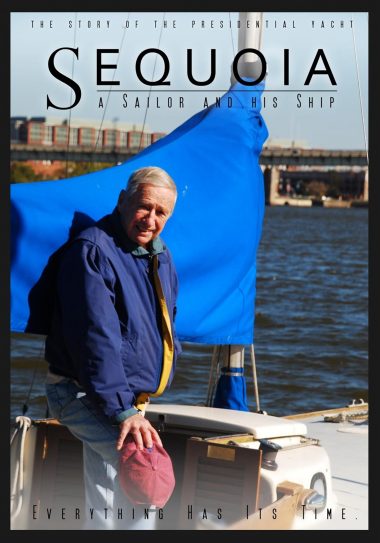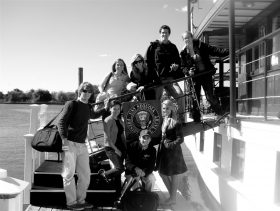A student-produced documentary about the U.S.S. Sequoia, which served as the presidential yacht from Herbert Hoover's administration until President Jimmy Carter auctioned it off in 1977, will be screened at the Asheville Film Festival Nov. 13.
Students who worked on the 34-minute “Sequoia: A Sailor and his Ship” were Conor Britain, Lauren Limerick, Tim Johnson, Kelly Murtagh, Katy Branston, Emily Kamischke, Chris Ford and Lizzie Napier, all of whom are 2009 graduates who developed the idea for the documentary during their Senior Capstone class led by Communications professor David Copeland. Britain is now enrolled in Elon’s new Interactive Media master’s program.
The film centers on Cpt. Giles Kelly, a former Navy man and U.S. foreign services officer, who was hired to captain the ship in 1983. After going into a period of private ownership after President Carter auctioned it, the boat was bought by a trust in the early 1980s with the purpose of raising enough money to give it back to the government. In the film, Kelly, who is Limerick’s grandfather, reflects on his experiences with the Sequoia and how it affected his life.
“The film is essentially about the relationship between a man and the ship that he captained for five years,” Britain said. “As we learned while filming the documentary, there exists a special bond between a captain and his vessel but, just like in relationships between people, it’s a complicated one. We were extremely interested in how that bond played a role in Captain Kelly’s life and wanted to show that through the documentary.”
The student team shot the documentary during the four days of Fall Break in 2008. They started editing the film in November of the same year and finished in April of 2009. You can view the “Sequoia: A Sailor and His Ship” trailer HERE.
“The film is one of my proudest accomplishments from my undergraduate career, and while I’m quite proud of the film itself and the technical achievement that it was for us, I think I regard the project so fondly because of the nature of the work we were doing,” Britain said. “It was incredible to work on something that has national relevance, and the energy level amongst the group throughout the shooting phase was really special.”

The Asheville Film Festival is entering its seventh year, and the four-day event features independent films from across the world. Entries will compete for awards, and the winning filmmaker in each category—feature fiction, short fiction, documentary, student and animation—will receive a $500 prize.
“The film turned out to be more work than we imagined at the start, but it was a fulfilling experience at the same time,” Johnson said. “The capstone project is supposed to be a summation of sorts of what you learned at Elon, but for me I think it was more of a learning opportunity. It’s really exciting the project is getting recognized, because Captain Kelly’s dedication to this national icon over two decades certainly deserves attention.”



